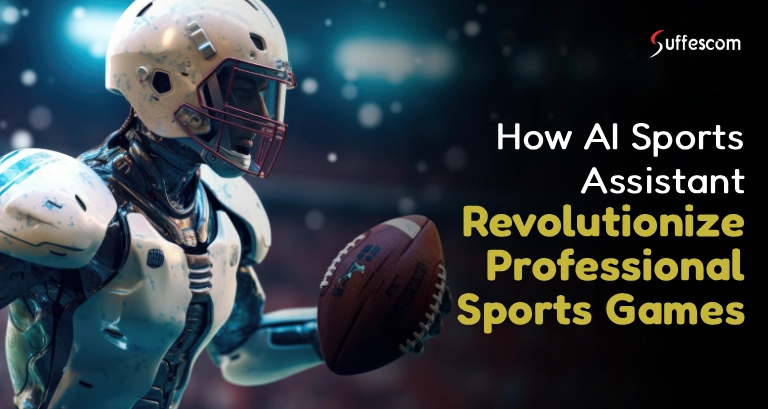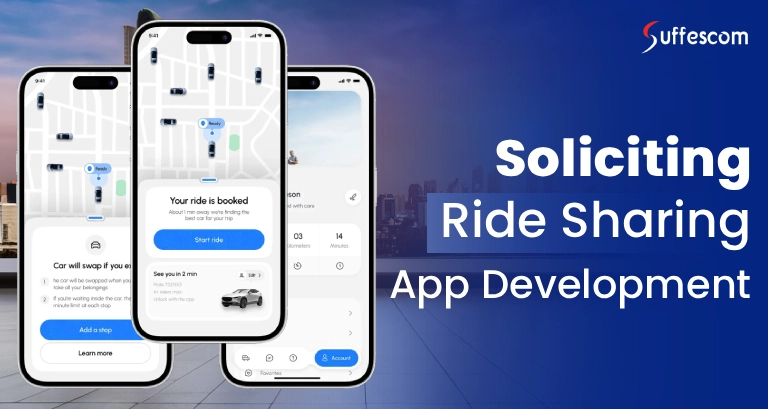How AI Sports Assistant Revolutionize Professional Sports Games?

An AI sports assistant is an intelligent software solution that leverages artificial intelligence, machine learning, and occasionally computer vision. It aims to assist sportspeople, coaches, spectators, and sports organizations with clever automation and decision-making.
These innovative systems handle a vast array of live sports data, including player statistics, body signals, game results, crowd reactions, and even fan preferences. They study patterns, pick up on language, and learn over time to offer useful insights. Whether it’s a custom workout plan, tailored content, or instant support, they adjust as needed, making everything faster and more personalized.
The Rise of AI Sports Assistants
In today’s ultra-competitive professional sports world, where one misstep or momentary lapse can cost a team the game. Thus, AI-powered sports assistants are quickly becoming a crucial edge. It is not only about future potential anymore, the numbers speak volumes. As per Verified Market Research, the global AI in sports market reached $8.55 billion in 2024, and it’s expected to skyrocket to $64.63 billion by 2032, increasing with an unexpected CAGR of 33.5% over the next few years.
If you’re in the sports business, this shift matters. AI is moving beyond the hype, it’s becoming the backbone of how teams train, engage, and grow. From tech startups to franchises, even traditional broadcasters and companies are adapting AI to boost performance and unlock new revenue. It’s fast, data-driven, and scalable. In this blog, you’ll find what AI Sports Assistants do, where they add value, and how your business can stay ahead.
How AI Sports Assistant Platforms Work
An AI Sports Assistant brings together data, intelligence, and real-time delivery to improve training, fan engagement, and business operations. Here's a quick breakdown of how it works:
1. Data Collection
It starts by collecting data from different sources such as player wearables, match stats, game videos, and fan interactions on apps or websites.
2. Smart Processing
At this step, it organizes and analyzes the data. Apart from machine learning and analytics tools, which help to spot patterns, make predictions, or suggest actions, whether it's for training or engagement.
3. Real-Time Delivery
Once prepared, insights are delivered through mobile apps, dashboards, voice assistants, or chatbots. It is directly related to athletes, fans, or coaches.
4. Ongoing Learning
The assistant keeps learning. It gets feedback from users and outcomes to refine its suggestions over time to become the data more accurate and personalized.
Build Your Custom AI Sports Assistant Today
Looking to elevate athlete performance or fan engagement? Partner with our expert AI development team to create a tailored sports assistant app that drives real-time insights and business growth.
Key Functionalities of a Scalable AI Sports Assistant App
Each feature is crafted to enhance performance, drive user engagement, and support long-term business growth. Backed by a robust AI development service, the platform is fully adaptable for sports organizations, media partners, and enterprise-level deployments.
1. Fantasy & Prediction Support
Utilize past player performance, live game statistics, and behavioral patterns to drive smart fantasy leagues and the prediction of match outcomes. This promotes user engagement and opens up new revenue streams for fantasy sports websites.
2. Computer Vision Integration
Facilitate automated player tracking, and video highlights extraction with embedded vision features. This assists scouting, game breakdown, and audience engagement with reduced manual intervention.
3. Match Schedule & Smart Reminders
Offers personalized match alerts, player information, and pre-game content according to user preferences and local time zones. It boosts fans' re-engagement and increases daily active usage.
4. Real-Time Stats & Analytics Dashboard
Provide real-time match analysis, player comparison stats, and predictive analytics on an interactive dashboard. It is ideal for sports teams, broadcasters, and training institutions that want to convert raw data into actionable insights.
5. Interactive Polls & Quizzes
Enhance the fan experience with interactive features, incorporating real-time opinion polls, and match predictions. It stimulates audience engagement, aids marketing campaigns, and captures user sentiment analytics.
6. Multilingual & Global Support
Supporting various markets with multi-language content delivery, localized alertness, and region-based fan engagement models. It is a must to scale geographically and maximize market reach.
7. Payment System Integrations
Provides scalable, versatile payments via wallets, UPI, credit cards, crypto, and subscription gateways. It gives guarantees towards a seamless monetization pipeline for smooth user journeys.
8. Sports Player Tokenization
Provide digital player assets (NFTs or tokens) for fan ownership, fantasy trading, or team investments. Opens next-gen engagement and blockchain monetization models for clubs and leagues.
9. Voice-Controlled Sports Assistant
Enable the usage of match updates, predictions, and team stats through voice commands integrated with Siri, Alexa, or custom voice bots. Accessibility and on-the-go interactions increase by leaps and bounds.
10. Multi-Sport Mode
Transition seamlessly between several sports such as cricket, football, basketball, etc. at one common platform. It enhances user stickiness, facilitates cross-sport engagement, and makes platform scalability easier for businesses.
How Artificial Intelligence Improves Athlete Training?
Artificial intelligence is now reshaping athlete training, recovery, and testing limits, providing data-driven precision that is previously unavailable through conventional coaching techniques. The following is how companies throughout the sports platform are adopting AI to streamline training results:
1. Personalized Training
AI algorithms check each athlete's performance metrics, such as biometrics and training records. It offers hyper-personalized workout routines that guarantee customized progressions and align with individual ability for optimal performance.
2. Prevention of Injury
Machine learning predictive analytics identify patterns of fatigue, movement imbalance, and risk of overtraining. Coaches and physiotherapists use these notifications to modulate training loads that prevent injuries.
3. Performance Monitoring
From speed and endurance to skill and technique, AI monitors granular performance data in real-time. This allows coaching staff to identify performance early and implement data-driven adjustments for accelerated improvement.
4. Motion & Biomechanics Analysis
Computer vision and sensor fusion offer advanced analysis of biomechanics that includes joint angles, posture, stride, and impact force. These insights optimize movement efficiency and minimize long-term stress on the athlete's body.
5. Lessons from Elite Athletes
AI platforms often utilize anonymized data and training patterns from top performers. This enables emerging athletes to learn from the greatest, compare improvement, and take tested strategies from related disciplines or roles.
6. Sleep & Recovery Optimization
AI-powered platforms help to check sleep cycles and heart rate variability that suggest optimized recovery protocols. It facilitates quicker regrouping and sustained peak performance throughout the season.
7. Mental Health & Focus Monitoring
Through voice tone analysis, facial expression, or journaling activity, AI systems check the indicators of stress, exhaustion, or cognitive burnout. Coaches and support personnel use this data to initiate early interventions.
8. Wearable Device Integration
AI assistants receive real-time information from smart wearables, such as smartwatches and GPS monitors, to create a 360° training profile.
Use Cases of AI Sports Assistants Across Industries
The adaptability of AI sports assistants makes them a strategic asset across multiple sports industry segments. Following are the use cases:
1. Sports Franchises
AI sports assistants help franchises to optimize team performance, monitor player health, and make data-backed coaching decisions. It also enhances fan loyalty along with digital engagement strategies through a comprehensive sports fan engagement app.
2. Fantasy Platforms
AI integration supports accurate player predictions, real-time stats, and behavior-based game suggestions. It facilitates user retention, participation, and platform monetization.
3. Broadcasters
Media companies employ AI assistants that automates match commentary, provides predictive insights during live games. It gives personalized viewer experiences across OTT and broadcast platforms.
4. Fitness Brands
Fitness brands are leveraging smart assistants to offer real-time feedback, vision-based movement analysis. It gives customized suggestions that make fitness app development more intelligent and user-centric.
5. Sports Academies & Training Facilities:
AI tools help coaches with athlete-specific performance analysis, recovery optimization, and injury prediction. It is a data-centric training approach that reduces operational inefficiencies.
How Personal AI Sports Assistant Enhance The Engagement and Experiences
From immersive fan journeys to smarter support touchpoints, AI Sports Assistants are redefining how brands connect, and grow loyal communities in the sports ecosystem.
1. Enhanced Broadcasting & Journalism
AI boosts live commentary with real-time stats, predictions regarding the game, and player insights. This helps media teams to deliver smarter, more engaging content during broadcasts.
2. Sports Ticket Management
Smart assistants automate ticket booking, updates, and digital access. It also analyzes fan behavior to suggest best times, prices, or seats.
3. AR and VR Experience
An immersive AR/VR tech gives fans interactive stadium tours or courtside views. It converts passive viewing into a more involved, virtual game-day experience.
4. Personalized Content
Content delivery is tailored according to fan preferences & viewing habits based on fan history, team loyalty, and engagement patterns. This keeps users hooked with relevant replays, and offers.
5. Real-Time Match Updates
Pushes accurate, live match stats, scores, and tactical analysis to users instantly. Helps fans stay informed without switching between platforms.
6. Interactive Chatbots
24/7 bots answer match-related queries, suggest content, or assist with purchases. They also run trivia and quizzes to keep fans engaged between games.
7. Gamification Elements
Fans earn rewards through predictions, leaderboards, or digital collectibles. These elements boost retention and build long-term loyalty.
8. Voice Assistant Integration
Users can access schedules, results, or highlights using simple voice commands. This hands-free experience increases accessibility and user satisfaction.
Get a Cost Estimate for Your AI Sports Platform
Not sure where to start? Get a detailed breakdown of features, timelines, and costs for developing your AI-powered sports assistant app that is designed to fit your business goals.
What Factors Impact The Cost of AI Sports Coach Development
When planning to build a smart sports assistant platform, understanding the cost drivers is crucial. From tech stack decisions to integration depth, several elements impact your total investment. Below is a breakdown of the most influential factors:
1. Platform & Device Scope
The more platforms you include, such as mobile, desktop, and wearables, the higher the cost. Each device needs separate design, testing, and optimization cycles. Businesses should prioritize according to the target users and rollout strategy.
2. AI Model Complexity
Simple automation tools are less expensive. However, if your assistant needs live predictions, motion monitoring, or behavior suggestions, it will need sophisticated machine learning models. These entail custom training, extra compute resources, and longer development time.
3. Integrations with Third-Party Services
Integration with APIs such as player databases, live score sources, or wearable sensors can be costly. Some involve licensing fees or entail heavy customization. Nonetheless, integrations are crucial for a smooth user experience and operational scalability.
4. UI/UX Design Requirements
A refined, intuitive interface enhances adoption but incurs higher design hours. Additions such as adaptive dashboards, multilingual support, or accessibility compliance affect the development effort and expense.
5. Backend Infrastructure
AI assistants depend greatly on real-time processing and big datasets. This involves investing in secure cloud hosting, scalable server design, and quick database systems. The more real-time your app must operate, the stronger and more expensive your backend.
6. Ongoing Maintenance & Upgrades
Post-launch support also effect the cost. It includes AI model retraining, bug fixing, analytics enhancements, and support. These recurring expenses ensure long-term reliability, user satisfaction.
Revenue Models That Drive ROI for AI Sports Assistant Platforms
Choosing the right mix of monetization strategies can turn your AI sports assistant into a scalable, revenue-generating asset for long-term business growth.
1. Subscription-Based Services
Offer monthly or annual plans according to the needs of fans, fitness enthusiasts, or professional teams. It ensures predictable cash flow that allows it to roll out gated features over time.
2. In-App Purchases
Sell training programs, fantasy league tools, or performance insights directly within the app. It keeps the experience better while boosting revenue from active users.
3. Sponsored Content & Brand Partnerships
Collaborate with sports brands, or health-tech firms. As sponsored training videos, or co-marketed content create new revenue opportunities without compromising user experience.
4. Premium Features for Fans or Teams
Add value through advanced capabilities such as custom dashboards for coaching staff, exclusive AR match views, or real-time player telemetry for hardcore fans.
Scaling Sports Businesses with the Future Capabilities of AI Sports Assistants
As competition sharpens and fan expectations are growing day by day, future-ready AI tools are enabling sports enterprises. Here’s how next-gen innovations are driving impact:
1. Autonomous Coaching Bots
Smart training bots help to adjust workouts in real-time based on athlete performance. It cuts down the need for constant human oversight.
2. Emotion-Aware AI Companions
Tech that interprets player emotions, stress levels, and motivation, helping coaches and teams. It surely improves mental readiness and well-being.
3. Fan-Based Predictions
By utilizing advanced algorithms analyze the behavior and preferences. It delivers targeted content, boosts fan loyalty, and in-app monetization.
4. AI Referees
Machine-led officiating tools ensure faster, unbiased decisions in matches. It reduces disputes and elevates fairness in gameplay.
Final Words!
In today’s dynamic sports landscape, staying competitive more than talent is crucial. It needs smart tools in it. Thus, an AI powered sports assistant app bridges performance, personalization, and profitability. It help businesses to deliver measurable value at scale.
Whether you're a sports franchise aiming to improve athlete output, a media company transforms viewer engagement, or a platform owner exploring new revenue channels, it is the right time to act. Investing in intelligent, adaptive systems is a business necessity. By integrating the right AI capabilities in business secure your business operations for tomorrow.
FAQs
1. What exactly does an AI Sports Assistant do for my business?
It helps streamline your operations and unlock new revenue channels. Whether you’re running a sports franchise, training academy, or a fan engagement app, the assistant can automate real-time analytics, deliver personalized content. It enhances player performance tracking and improves user retention through more innovative, data-driven experiences.
2. How is AI incorporated into athlete training or coaching platforms?
It's integrated into backend systems by using machine learning models and intelligent algorithms. The system scans performance data and biometrics to recommend individualized training regimens. It monitors progress, prevents injuries, and even guides mental conditioning. It's all real-time on multiple devices, including wearables.
3. Is the AI trained on custom data or on external datasets?
It is based on the business use case. For customized training, in-house datasets like an athlete's performance history and biometric data offer better insights. Yet, external data like injury trends, historical match data, and game footage are utilized to make it better.
4. Can AI be trained to support niche sports or local fan habits?
Yes. Proper training of data and model tuning can make it a niche, sport-specific and localized fan interaction. It consists of language options, cultural influences, and regional game structures that can be incorporated into the platform so the assistant is appealing to the target audience.
5. How can I get started with building an AI-powered sports assistant app for my sports academy?
Start by outlining your academy’s core needs, that is training, analytics, or engagement. Partner with a tech team experienced in AI-powered sports assistant apps, choose the right features, and launch with an MVP to scale efficiently.







